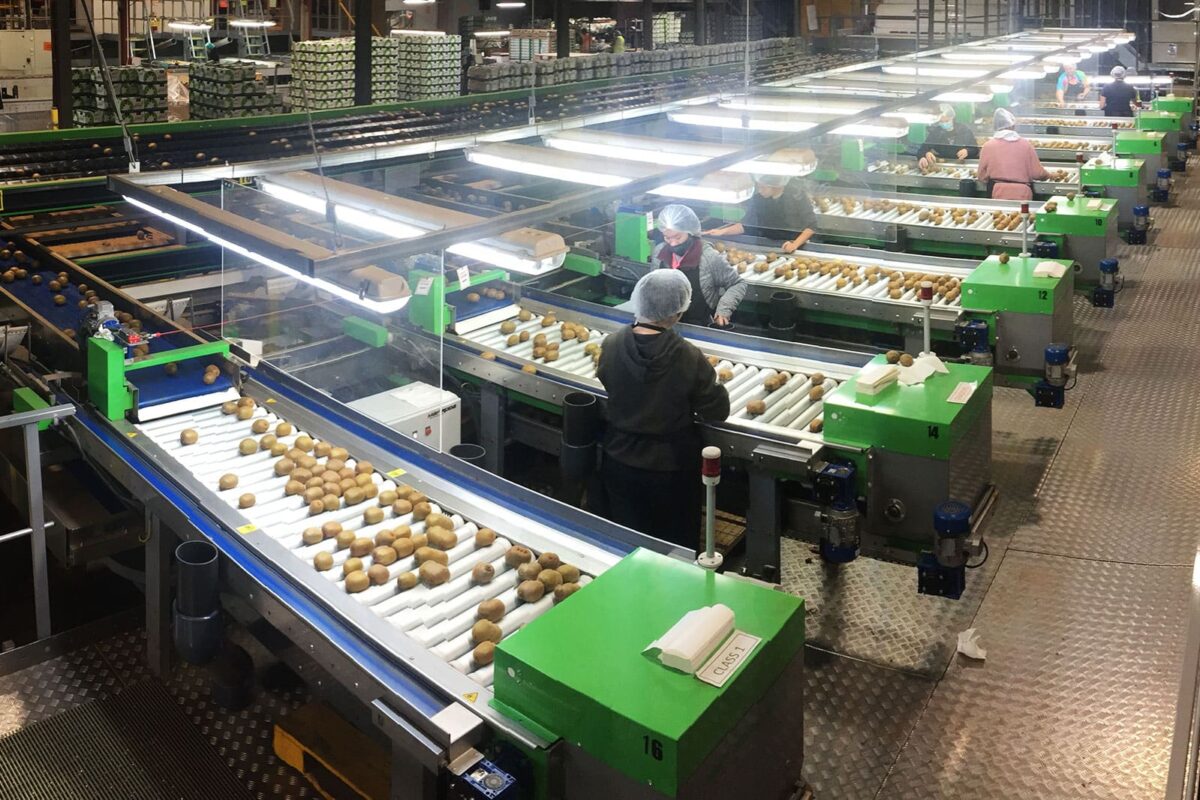Newshub spoke to us about the innovative solution we developed for “sweaty fruit”. Packhouses have issues with stickability when labelling some smooth-skinned produce (kiwifruit, avocados, nectarines etc).
Lance Jimmieson, managing director of Jackson Engineering, describes the issue as “like taking a bottle of milk or a bottle of beer out of the fridge and putting it on the bench and it will sweat because it’s cold. Kiwifruit do the same and when they sweat the labels don’t stick, which is a major problem for them.”This article explains how we solved the issue for leading packhouse, Trevelyan’s. Read it HERE or in full below:
By James Fyfe
A packhouse in Te Puke has found an innovative solution to the industry-wide problem of ‘sweaty’ kiwifruit.
The problem arises when gold kiwifruit are taken out of temporary cold storage to be labelled and packed.
Because the outside air is warmer, condensation forms on the skin of the fruit, causing it to “sweat” and making attaching a label a tricky affair.
While that might not sound like such a big deal, it’s caused headaches all over the industry.
Carol Ward, chief innovation and sustainability officer at Zespri, says labels on the fruit are a must.
“All Zespri Kiwifruit that we export from New Zealand is required to be labelled,” Ward told Newshub.
In fact, kiwfruit labelling requires a 90 percent stick-rate for the export market, otherwise the fruit will be rejected at their final destination.
Ward admits the labelling can be complicated for packhouses but says clear labelling plays an important role in alerting consumers to what product they are looking at.
“There are some challenges with labels, as they need to hold together in high humidity in our markets and in cooler conditions when in storage,” she says.
James Trevelyan, managing director of Trevelyan’s packhouse, says the difficulty arises from the relatively short harvesting season of kiwifruit.
“We can’t pack the volume that’s coming to us at the required time,” Trevelyan told Newshub.
He says the problem only affects gold kiwfruit and not green, as gold lacks the fur which helps labels stick to it.
The solution is to put the fruit in cold storage until it can be graded, packed and labelled in the packhouse.
“But the problem with the gold fruit, or G3, is it’s got a smooth skin and when we bring it back out to pack it, typically at the time of the year we’re packing it moisture forms on the fruit so we can’t get a label on it,” explains Trevelyan.
Lance Jimmieson, managing director of Jackson Engineering, describes the issues as “like taking a bottle of milk or a bottle of beer out of the fridge and putting it on the bench and it will sweat because it’s cold.”
“Kiwifruit do the same and when they sweat the labels don’t stick, which is a major problem for them.”
Jackson Engineering worked with Trevelyan’s to develop the technology to fix the problem.
“What we did was put in a system that created an environment in the packing hall where it’s a very, very dry environment,” says Jimmieson.
“So the kiwifruit can be taken out of cold storage and handled and graded and the labels put on in an environment that’s so dry that they won’t sweat – there’s no moisture in that environment at all. There’s insufficient moisture in the environment to allow them to sweat and then the labels stick.”
Jimmieson says despite appearing to be “pretty straightforward” he admits “there is a lot more to it than meets the eye from a technical angle”.
He thinks it could be a game-changer for the industry as it will streamline the process and allow things to run smoother and faster.
Trevelyan says the technology not only minimises risk to the quality of the fruit, as it doesn’t need to spend so long sitting around in storage, but also allows the company to be less reliant on the weather for its operations.
“You literally have to tiptoe around the weather to try and pack the fruit out,” he says. “So for us, what we’ve done is we’ve put this expense in and what we do is we continually pack, we have all our staff here, we’re flowing product that we can’t pack into coolstores and as soon as we have a rainy day or as soon as we’re over the peak we start flowing the fruit out of the coolstores so that it just flatlines all our production.
“We have all the staff here, the staff get continual work and it fills a big void between the gold harvest and the green harvest.”
